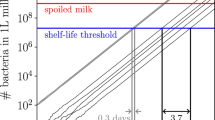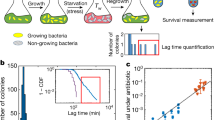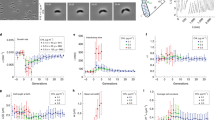Abstract
IN an article in Nature of April 28, p. 666, Sir Cyril Hinshelwood discusses some of the possible explanations for deviations from the logarithmic order of death sometimes shown among bacteria exposed to disinfecting agents. Where the final stages of decline are abnormally protracted (that is, where there is a resistant ‘tail’ of organisms), he suggests that the most obvious explanation would be the presence of some cells of abnormally high resistance, and that these might originate from the interruption of growth at the appropriate stage in the cell-cycle. He considers it possible that at certain phases in the growth of each individual cell there might be a stage of maximum resistance, possibly when the internal condition of the vegetative cell bears the maximum resemblance to a spore.
This is a preview of subscription content, access via your institution
Access options
Subscribe to this journal
Receive 51 print issues and online access
$199.00 per year
only $3.90 per issue
Buy this article
- Purchase on Springer Link
- Instant access to full article PDF
Prices may be subject to local taxes which are calculated during checkout
Similar content being viewed by others
References
J. Bact., 36, 83 (1938).
Author information
Authors and Affiliations
Rights and permissions
About this article
Cite this article
WHITE, H. Variation with Age in the Resistance of Bacterial Cells. Nature 168, 828–829 (1951). https://doi.org/10.1038/168828a0
Issue Date:
DOI: https://doi.org/10.1038/168828a0
Comments
By submitting a comment you agree to abide by our Terms and Community Guidelines. If you find something abusive or that does not comply with our terms or guidelines please flag it as inappropriate.



